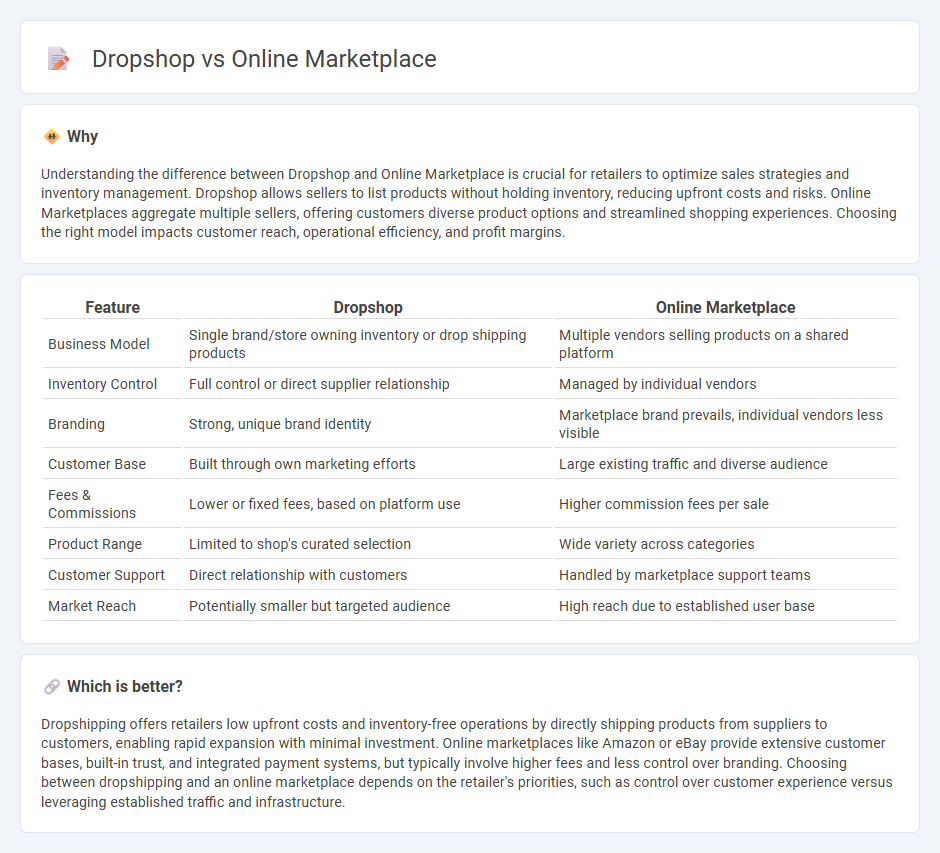
Dropshipping allows retailers to sell products without holding inventory, reducing upfront costs and streamlining order fulfillment directly from suppliers to customers. Online marketplaces aggregate multiple sellers under one platform, offering diverse product selections but often with higher competition and fees. Explore the advantages and challenges of Dropship versus Online Marketplace models to determine the best fit for your retail strategy.
Why it is important
Understanding the difference between Dropshop and Online Marketplace is crucial for retailers to optimize sales strategies and inventory management. Dropshop allows sellers to list products without holding inventory, reducing upfront costs and risks. Online Marketplaces aggregate multiple sellers, offering customers diverse product options and streamlined shopping experiences. Choosing the right model impacts customer reach, operational efficiency, and profit margins.
Comparison Table
| Feature | Dropshop | Online Marketplace |
|---|---|---|
| Business Model | Single brand/store owning inventory or drop shipping products | Multiple vendors selling products on a shared platform |
| Inventory Control | Full control or direct supplier relationship | Managed by individual vendors |
| Branding | Strong, unique brand identity | Marketplace brand prevails, individual vendors less visible |
| Customer Base | Built through own marketing efforts | Large existing traffic and diverse audience |
| Fees & Commissions | Lower or fixed fees, based on platform use | Higher commission fees per sale |
| Product Range | Limited to shop's curated selection | Wide variety across categories |
| Customer Support | Direct relationship with customers | Handled by marketplace support teams |
| Market Reach | Potentially smaller but targeted audience | High reach due to established user base |
Which is better?
Dropshipping offers retailers low upfront costs and inventory-free operations by directly shipping products from suppliers to customers, enabling rapid expansion with minimal investment. Online marketplaces like Amazon or eBay provide extensive customer bases, built-in trust, and integrated payment systems, but typically involve higher fees and less control over branding. Choosing between dropshipping and an online marketplace depends on the retailer's priorities, such as control over customer experience versus leveraging established traffic and infrastructure.
Connection
Dropshop leverages online marketplaces by integrating their platforms to streamline product listings and inventory management, enhancing sales reach and customer access. Online marketplaces provide the infrastructure and audience, allowing Dropshops to operate without holding physical stock, thus reducing overhead costs and increasing scalability. This synergy enables faster order fulfillment and seamless customer experience across various digital sales channels.
Key Terms
Platform Ownership
Online marketplaces consolidate products from multiple sellers on a single platform, enabling consumers to compare prices and reviews with ease. Dropshopping platforms, by contrast, allow entrepreneurs to own their online stores without handling inventory, relying on suppliers to ship products directly to customers. Explore the distinct advantages and challenges of each platform ownership model to determine the best fit for your business goals.
Inventory Management
Online marketplaces centralize inventory management by allowing multiple sellers to list products on a single platform, which streamlines stock updates and order processing. Dropshipping shifts inventory responsibility to suppliers, reducing seller-held stock and minimizing risks but requiring robust coordination to avoid stockouts. Explore more about how inventory management differences impact e-commerce strategies.
Fulfillment Model
An online marketplace connects multiple sellers to buyers, handling payment processing and often managing logistics, while dropshipping relies on a supplier directly shipping products to customers without inventory holding. Marketplaces typically offer integrated fulfillment services or third-party logistics solutions, enhancing control over shipping and delivery times. Explore how these fulfillment models impact customer satisfaction and operational efficiency in e-commerce.
Source and External Links
What Is an Online Marketplace? - AppDirect - An online marketplace is a website or app that offers products or subscription services from various sellers, facilitating transactions on a single platform where customers can shop from multiple merchants in one transaction without leaving the site.
The best online marketplaces for ecommerce sellers (2025) - Selling on online marketplaces like Amazon, Walmart, and eBay provides ecommerce sellers with access to built-in customer bases, trusted payment processing, global reach, and infrastructure support such as fulfillment services to grow businesses cost-effectively.
Top 20 ecommerce marketplaces in the world in 2025 - Leading global online marketplaces include Tmall, JD.com, and Pinduoduo, which dominate regions like China with massive sales volumes, extensive fulfillment systems, and niche focuses such as mobile-only grocery buying and cross-border sales facilitation.
 dowidth.com
dowidth.com